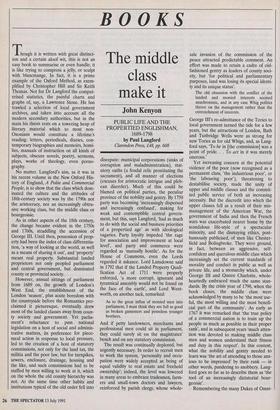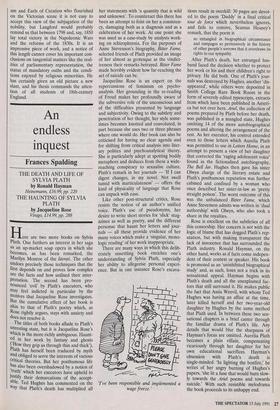BOOKS
The middle class make it
John Kenyon
PUBLIC LIFE AND THE PROPERTIED ENGLISHMAN, 1689-1798 by Paul Langford Clarendon Press, £48, pp. 608 Though it is written with great distinct- ion and a certain aloof wit, this is not an easy book to summarise or even handle; it is like trying to compress a jelly, or sculpt with blancmange. In fact, it is a prime example of the Oxford Method, as exem- plified by Christopher Hill and Sir Keith Thomas. Not for Dr Langford the comput- erised statistics, the painful charts and graphs of, say, a Lawrence Stone. He has trawled a selection of local government archives, and taken into account all the modern secondary authorities, but in the main his thesis rests on a towering heap of literary material which to most non- Oxonians would constitute a lifetime's reading: letters, periodicals, diaries, con- temporary biographies and memoirs, homi- lies, manuals of instruction on all kinds of subjects, obscure novels, poetry, sermons, plays, works of theology, even porno- graphy.
No matter. Langford's aim, as it was in his recent volume in the New Oxford His- tory of England, A Polite and Commercial People, is to show that the class which dom- inated the culture and the attitudes of 18th-century society was by the 1790s not the aristocracy, nor an increasingly obtru- sive working class, but the middle class or bourgeoisie.
As in other aspects of the 18th century, the change became evident in the 1750s and 1760s, straddling the accession of George III. Until then, possession of prop- erty had been the index of class differentia- tion, 'a way of looking at the world, as well as a means of sharing it out', and 'property' meant real property. Substantial landed proprietors not only peopled parliament and central government, but dominated . county or provincial society.
However, annual sittings of parliament from 1689 on, the growth of London's West End, the establishment of the London 'season', plus acute boredom with the countryside before the Romantics pro- claimed it picturesque, eventually drew most of the landed classes away from coun- ty society and government. Yet parlia- ment's reluctance to pass national legislation on a host of social and adminis- trative matters, its preference for piece- meal action in response to local pressure, led to the creation of a host of statutory commissions, not only for the land tax, the militia and the poor law, but for turnpikes, sewers, enclosure, drainage, housing and the like, and such commissions had to be staffed by men willing to work at it, which on the whole the old county hierarchy was not. At the same time other habits and institutions typical of the old order fell into disrepute: municipal corporations (sinks of corruption and maladministration), stat- utory oaths (a feudal relic prostituting the sacrament), and all manner of elections (excuses for aristocratic intrigue and pleb- ean disorder). Much of this could be blamed on political parties, the peculiar province of the nobility and gentry. By 1750 party was becoming 'increasingly dispersed and increasingly confused', making for weak and contemptible central govern- ment, but this, says Langford, `had as much to do with the social and business priorities of a propertied age' as with ideological vagaries. Party loyalty impeded 'the rage for association and improvement at local level', and party and commerce were regarded as 'mutually hostile'. As for the House of Commons, even the Lords regarded it askance. Lord Lansdowne said in 1792 that if the Landed Property Quali- fication Act of 1711 were properly enforced, 'a more corrupt, ignorant and tyrannical assembly would not be found on the face of the earth', and Lord Went- worth, on another tack, remarked:
As to the great influx of monied men into parliament, I must think they are full as good as broken gamesters and penniless younger brothers.
And if petty landowners, merchants and professional men could sit in parliament, they could surely sit on the magistrates' bench and on any statutory commission.
The result was continually deplored, but urgently necessary. In order to recruit men to work the system, 'personalty and occu- pation were widely accepted as being of equal validity to real estate and freehold ownership'; indeed, the level was lowered in many areas to embrace tradesmen, farm- ers and small-town doctors and lawyers, reinforced by parish clergy, whose whole- sale invasion of the commission of the peace attracted predictable comment. An effort was made to retain a cadre of old- fashioned gentry as leaders of county soci- ety, but 'for political and parliamentary purposes, land was losing its special identi- ty and its unique status'.
The old obsession with the conflict of the landed and monied interests seemed anachronistic, and in any case Whig politics throve on the management rather than the entrenchment of interests.
George III's re-admittance of the Tories to local government turned the tide for a few years, but the attractions of London, Bath and Tunbridge Wells were as strong for new Tories as for old Whigs, and, as Lang- ford says, `To be in [the commission] was a point of pride. . . To act in it was merely onerous.'
Yet increasing concern at the potential violence of the poor (now recognised as a permanent class, 'the industrious poor', or `the labouring poor'), threatening to destablilise society, made the unity of upper and middle classes and the commit- ted public service of both an increasing necessity. But the discredit into which the upper classes fell as a result of their mis- management of the American War, the government of India and then the French wars was exacerbated nearer home by the scandalous life-style of a spectacular minority, and the dismaying ethics, post- humously publicised, of men like Chester- field and Bolingbroke. They were ground, in fact, between an aggressive, self- confident and querulous middle class which increasingly set the current standards of morality and conduct in public as well as private life, and a monarchy which, under George III and Queen Charlotte, whole- heartedly embraced much the same stan- dards. By the crisis year of 1798, when the book closes, the middle class were acknowledged by many to be 'the most use- ful, the most willing and the most benefi- cial part of the community'. As early as 1767 it was remarked that 'the true policy of a commercial nation is to train up the people as much as possible in their proper rank', and in subsequent years 'much atten- tion was devoted to making middle class men and women understand their fitness and duty in this respect'. In this context, what the nobility and gentry needed to learn was 'the art of attending to those anx- ious to be impressed' by their rank — in other words, pandering to snobbery. Lang- ford goes so far as to describe them as 'the tool of an increasingly dictatorial bour- geoisie'.
Remembering the many Dukes of Omni- urn and Earls of Creation who flourished on the Victorian scene it is not easy to accept this view of the subjugation of the nobility, but Langford would probably remind us that between 1798 and, say, 1850 lay total victory in the Napoleonic Wars and the reforms of the 1830s. It is an impressive piece of work, and a notice of this length cannot cover his important con- clusions on tangential matters like the real- ities of parliamentary representation, the status of mandatory oaths and the condi- tions enjoyed by religious minorities. He has certainly given an old picture a new slant, and his thesis commands the atten- tion of all students of 18th-century England.



















































 Previous page
Previous page